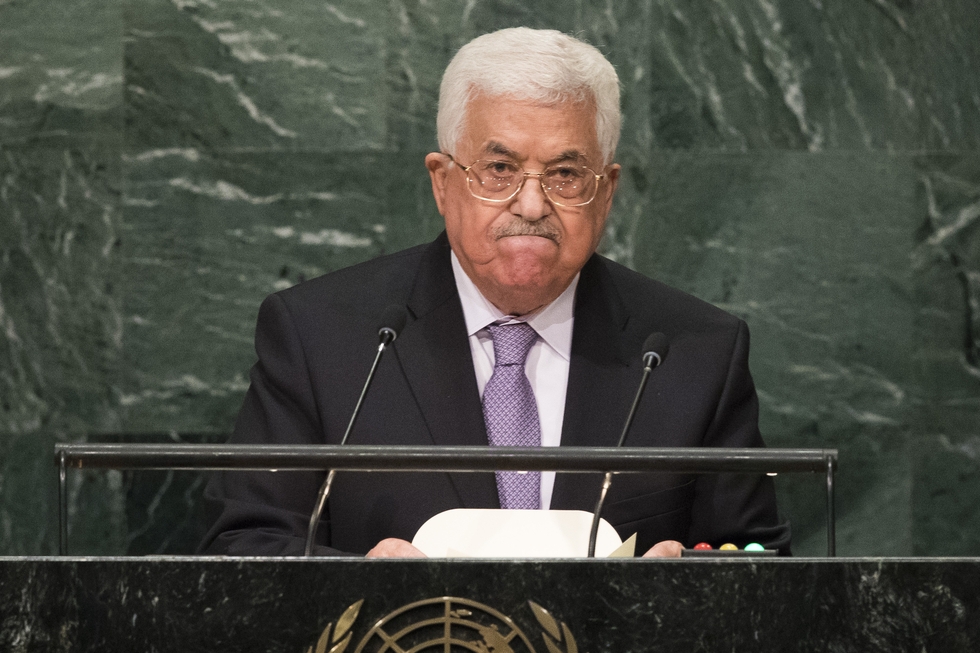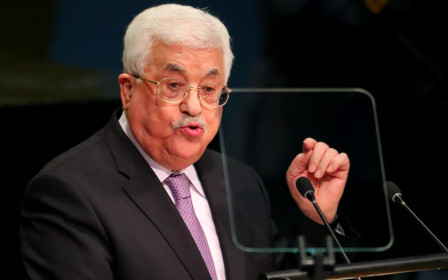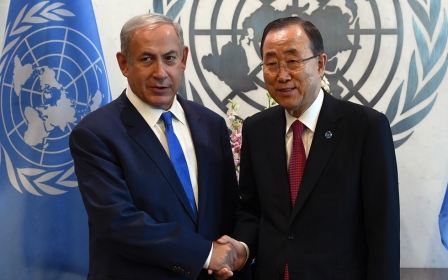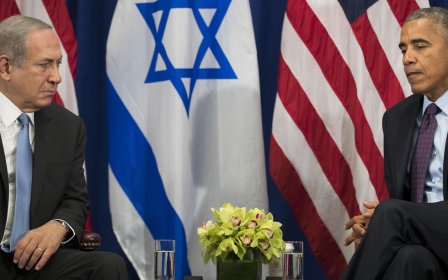While Netanyahu lectures, Abbas pleads - but who is listening?

The 2016 annual pilgrimage of world leaders to address the United Nations General Assembly in New York was dominated by the Syria crisis. But while many speakers ramble on to a half empty hall, others try to get important messages across to the assembly of world nations.
Those speaking on the Palestinian-Israeli conflict have tended to attract particular attention as the world holds its breath to see if there is any chink of hope that this decades-old conflict could soon be resolved.
US President Barack Obama, making his final address, kicked matters off, telling Palestinians to "reject incitement and recognise the legitimacy of Israel”. He also told Israelis that peace won't come until "Israel recognises it cannot permanently occupy and settle Palestinian land".
However, the irony of one of his other statements was lost even on him when he said, with reference to Donald Trump, "A nation ringed by walls would only imprison itself," referring to Trump’s plan to build a wall on the border with Mexico. Israel, of course, is doing just that.
One state?
Palestinian President Mahmoud Abbas's speech was more a plea to the world community that Palestinians had gone more than the extra mile for peace. “As you all are aware, we have accepted the primacy and judgment of international law and resolutions of international legitimacy, and made a historic and immense sacrifice, when the Palestine Liberation Organisation (PLO), the sole legitimate representative of the Palestinian people, accepted to establish the State of Palestine on the 4 June 1967 borders with East Jerusalem as its capital. What more can be asked of us?”
Abbas described Israeli violations that are indicative of its real intentions not to reach a just peace with the Palestinians. He said that Israel “must cease all of its settlement colonisation activities and aggressions against our cities, villages and refugee camps. It must cease its policies of collective punishment and its demolition of Palestinian homes. It must cease its extrajudicial executions and cease the arrest of our people, and must release the thousands of our prisoners and detainees. It must cease its aggression and provocations against the Holy Al-Aqsa Mosque. For all of these policies and practices prevent an environment in which peace can be realised in our region.”
He asked how can anyone seeking peace perpetrate such actions. Its actions he claimed undermine realization of the two-state solution on the basis of the 1967 borders. He then asked “Does Israel want one state”? That question was probably the most telling in his speech as the PA has not been known to even contemplate a one-state solution. Is Abbas therefore preparing the ground for a shift in policy as he sees the two-state solution disappearing before his eyes?
Plea to Britain
The other headline-making statement of his speech was the request that as we approach the 100th anniversary of the “notorious” Balfour Declaration, Britain should “draw the necessary lessons and to bear its historic, legal, political, material and moral responsibilities for the consequences of this declaration, including an apology to the Palestinian people for the catastrophes, miseries and injustices that it created, and to act to rectify this historic catastrophe and remedy its consequences, including by recognition of the State of Palestine.”
While Palestinians would welcome such an apology, they would place a strategy for realising their rights above this. The speech lacked an articulation of the strategy the PA has for achieving this and left Palestinians disappointed and frustrated. The reaction to his speech was flat in comparison to the almost euphoric reception to his speech in 2012 when he asked the Assembly to endorse the PLO’s request for Palestine to be recognised as a non-member observer state, which was subsequently accepted with an overwhelming majority.
'Moral farce'
The Israeli Prime Minister as usual treated the United Nations with complete disdain. The organisation which Israel claims gave it its legitimacy is seen by Netanyahu as an anti-Israel organisation. He stated that “the UN, begun as a moral force, has become a moral farce”. He slammed the UN Human Rights Council as a “joke” claiming that “each year it condemns Israel more than all the countries of the world combined”. He even described UNESCO as “part of the circus”. In April, UNESCO passed a resolution on Jerusalem which infuriated Israel by describing "so-called" Jewish sites and putting the "Western Wall Plaza" in quotation marks.
Interesting that Netanyahu should claim Palestinians are stuck in the past by talking about Balfour when the Zionist movement’s claim to Palestine goes back thousands of years
Netanyahu likened this to “denying the connection between the Great Wall of China and China”. However, his message was that Israel is far from isolated, enjoying relations with 160 countries and most importantly, he claimed that “for the first time in my lifetime, many other states in the region recognise that Israel is not their enemy. They recognise that Israel is their ally. Our common enemies are Iran and ISIS. Our common goals are security, prosperity and peace. I believe that in the years ahead we will work together to achieve these goals, work together openly.”
He did admit however, albeit indirectly, that it is the US that has his and Israel’s back at the UN and hardly anyone else. “The United Nations denounces Israel; the United States supports Israel.” He went on to ridicule Abbas’s speech and in particular his request for an apology from Britain for the Balfour Declaration. “He's preparing a lawsuit against Britain for that declaration from 1917. That's almost 100 years ago – talk about being stuck in the past.” Interesting that he should claim Palestinians are stuck in the past going back just a century when the Zionist movement’s claim to Palestine goes back thousands of years.
Invitation to Abbas
Netanyahu did not resort to any physical prop this time unlike those he used in the past, particularly his claim Iran was close to producing a nuclear bomb. However, his virtual prop was an offer to PA President Abbas. “Wouldn't it be better if instead of speaking past each other we were speaking to one another? President Abbas, instead of railing against Israel at the United Nations in New York, I invite you to speak to the Israeli people at the Knesset in Jerusalem. And I would gladly come to speak to the Palestinian parliament in Ramallah,” he asked.
It was left to Jordan’s King Abdullah to summarise where things stood, implicitly laying blame for the stalemate at Israel’s door: “No injustice has spread more bitter fruit than the denial of a Palestinian state. I say: Peace is a conscious decision. Israel has to embrace peace or eventually be engulfed in a sea of hatred in a region of turmoil.”
What both Netanyahu and Abbas must have realised was the clear descent of the Middle East conflict from its usual prominence as an issue to almost a side issue. That may be comforting for Israel as it seeks to deflect the world’s attention to continue its colonisation of Palestine, but it is worrying for Palestinians.
The most unfortunate message that could be sent to Palestinians is that their plight is only visible to the world when they resort to violence as their peaceful, non-violent strategy seems to have tragically failed.
Israel too should realise that despite Netanyahu's words, Israel is isolated among ordinary people, if not among governments. Netanyahu should also reflect that he too is isolated; after all, he needs 20 security guards to accompany him to the toilet in New York.
- Kamel Hawwash is a British-Palestinian engineering professor based at the University of Birmingham and a longstanding campaigner for justice, especially for the Palestinian people. He is vice chair of the Palestine Solidarity Campaign (PSC) and appears regularly in the media as commentator on Middle East issues. He runs a blog at www.kamelhawwash.com. He writes here in a personal capacity.
The views expressed in this article belong to the author and do not necessarily reflect the editorial policy of Middle East Eye.
Photo: President of the Palestinian Authority Mahmoud Abbas addresses the United Nations General Assembly at UN headquarters, 22 September 2016 in New York City. (AFP)
New MEE newsletter: Jerusalem Dispatch
Sign up to get the latest insights and analysis on Israel-Palestine, alongside Turkey Unpacked and other MEE newsletters
Middle East Eye delivers independent and unrivalled coverage and analysis of the Middle East, North Africa and beyond. To learn more about republishing this content and the associated fees, please fill out this form. More about MEE can be found here.





